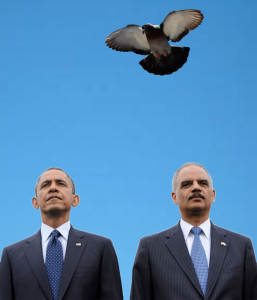U.S. Attorney General Eric Holder promised Congress a thorough investigation into whether high-frequency trading violates laws against insider trading. Holder said he is responding to concerns being raised about whether the practice creates an uneven playing field for investors.
Of course using high-speed communications creates an “uneven playing field.” That’s the point.
Speed has always been an advantage in trading. Runners, telegraphs, fiber-optics, microwaves and lasers — anything to gain an advantage has been utilized. (Read Christopher Steiner’s excellent book Automate This: How Algorithms Came to Rule the World).
For example: in 1815, the combined forces of Britain and Prussia defeated Napoleon’s army at the Battle of Waterloo. But even before the dust had settled on the battlefield, a carrier pigeon belonging to the House of Rothschild was on its way across the Channel to London. Nathan Rothschild, informed ahead of other traders that the country was not to be over-run by the French, consequently made a killing by buying British government bonds.
Financial markets have moved beyond carrier pigeons. Even though New York and Chicago are 700 miles apart, fiber-optic cables transmit data between the two cities in about seven milliseconds. In high-speed trading, that is a long time.
Between March and July 2009, a couple of entrepreneurs spent $300 million building a straighter, shorter fiber-optic link connecting the two financial centers, reducing the time taken to send data by about three milliseconds.
That ultra-fast connection was built by Jim Barksdale, the founder of the company that would later become Netscape, and Dan Spivey. This nearly straight fiber-optic link between Chicago and New York City shaves three milliseconds off the previously fastest connection between these two cities… and cost $300,000,000. Barksdale financed the line almost entirely with his personal funds. It is said that his company, Spread Network, now charges 8 to 10 times more for use of his cable than competitors, about $3 million per year, per user.
There are more players in the high-speed, high-frequency trading spaces than Spread Networks. But all of these types of companies are run by individuals that put a great deal of wealth at risk to make more wealth. Class envy, class warfare are the mainstay of the modern Democrat party.
Make no mistake, this Holder is not investigating “unfair advantages.” This is about the Democrats and Barack Obama using the Justice Department to once again create the impression that the GOP is protecting the wealthy while hurting the “little guy.”
“…Democrats in Congress are renewing a push to levy fees on high-frequency trading in an effort to generate hundreds of billions of dollars in revenue, or tax the practice out of existence. he measure isn’t likely to move forward in the House, where no member of the Republican majority has signed on as a co-sponsor.”
It is pure political posturing.


Recent Comments